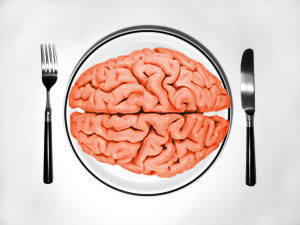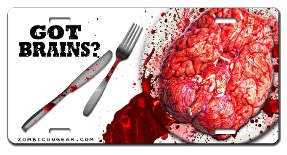Neuroscience
Are neuroscientists taking jobs away from philosophers, sociologists and gender theorists?
In case you haven't realized yet, my job posting for a Tenure-Track Position in Neuroetiquette and Gender Theory was a spoof. The details were inspired by the highly unrealistic expectations of academia and by a disparate collection of neurowords.
I think the neuro-panic among social scientists is overblown. How many philosophers, sociologists, and gender theorists are unemployed because their respective departments have decided to hire neuroscientists instead? How many developmental neurobiologists have applied for this Instructor of Philosophy position at Rochester Community and Technical College? Will a cognitive neuroscientst be able to teach transnational feminism or postcolonial feminism, queer theory, and critical race theory in the Women's and Gender Studies Program at Illinois State University?
Are we living in a neuroculture?
Daniel Buchman and David Dobbs asked that question two years ago. Their answers were "yes" and "of course we do!" More recently, a conference on Culture, Mind, and Brain: Emerging Concepts, Methods, Applications was held at UCLA:
All sarcasm aside, I am in favor of multidisciplinary research. And I strongly endorse critical thinking about neuroscience. However, some self-appointed pontificators want to strip the brain of any power over human thought. At those times, it's good to see a defence of cognitive neuroscience. I'm starting a backlash against the anti-neuro backlash. After nearly 7 years of critical neuroblogging, it might be time for a change: The Neurocomplimenter.
But I never tire of highlighting those neuro-analogies that go over the top...
- The Use And Abuse Of The Prefix Neuro- In The Decades Of The Brain
Two Croatian academics with an anti-neuro ax to grind have written a cynical history of neuroword usage through the ages (Mazur & Rinčić, 2013). Actually, I believe the authors were being deliberately sarcastic (at times), since the article is...
- Meet The Neuro Doubters
Meet the “neuro doubters.” The neuro doubter may like neuroscience but does not like what he or she considers its bastardization by glib, sometimes ill-informed, popularizers. A gaggle of energetic and amusing, mostly anonymous, neuroscience...
- Neuro Gasm Is Part Of The New Neuro Culture
"Neuro is an innovative beverage company dedicated to developing the highest quality functional beverages available." One gets PASSION IN EVERY BOTTLE with Neuro Gasm, which utilizes L-arginine and L-citrulline to improve a healthy blood flow, improve...
- What Is This, Anyway?
The Neurocomplimenter is a new project designed to counter gratuitous anti-neuroscience sentiment. It’s part of my campaign to combat pop neurobashing profiteers. The Neurocomplimenter It’s here! I’m starting a backlash against...
- Not Sure What Fork To Use? The Etiquette Dinner Can Help!
Etiquette Dinner Tuesday, November 13, 2012 • 6:00 p.m.-8:00 p.m. Location: Orem Alumni Hall | Samuel Riggs IV Alumni Center When can I begin my meal? Which glass is mine? Where do I put my elbows? Learn the answers to these questions and many...
Neuroscience
Neuroetiquette and Neuroculture
 |
| Discover neuro-etiquette: fork and knife in action |
Are neuroscientists taking jobs away from philosophers, sociologists and gender theorists?
"We need a neurocultural manifesto because the brain has been put forward by others as foundational for knowing about the self and social life, because neuroscientists are being asked to be the philosophers, sociologists and gender theorists of our era - they are being asked to do our jobs - and are responding with enthusiasm, and also because brain matter is mattering."
- from Neurocultures Manifesto by Victoria Pitts-Taylor.
In case you haven't realized yet, my job posting for a Tenure-Track Position in Neuroetiquette and Gender Theory was a spoof. The details were inspired by the highly unrealistic expectations of academia and by a disparate collection of neurowords.
- Neuroetica -- I initially had a tough time decoding this word, translating its orthography to phonology and semantics. Neurorotica? Neuroetiquette? No, neuroetica is an Italian word from an article in Neuoethics that takes "a Look at the Development of the Italian Debate on Neuroethics."
- Neuroetiquette -- Much to my dismay, a writer at New York Etiquette Guide had already coined the word 'neuro-etiquette' in her blog post on neuroplasticity, learning to play the piano, and how to properly hold your knife and fork.
- Neuroculture -- Etiquette is part of culture, of course. One encounters the word 'neuroculture' in many online discourses, from the tenets of the Neurocultures Manifesto to David Dobbs' blog Neuron Culture to the lifestyle marketing claim that Neuro Gasm Is Part Of The New Neuro Culture.
I think the neuro-panic among social scientists is overblown. How many philosophers, sociologists, and gender theorists are unemployed because their respective departments have decided to hire neuroscientists instead? How many developmental neurobiologists have applied for this Instructor of Philosophy position at Rochester Community and Technical College? Will a cognitive neuroscientst be able to teach transnational feminism or postcolonial feminism, queer theory, and critical race theory in the Women's and Gender Studies Program at Illinois State University?
Are we living in a neuroculture?
Daniel Buchman and David Dobbs asked that question two years ago. Their answers were "yes" and "of course we do!" More recently, a conference on Culture, Mind, and Brain: Emerging Concepts, Methods, Applications was held at UCLA:
The aim of this 2-day conference is to highlight emerging concepts, methodologies and applications in the study of culture, mind, and brain, with particular attention to: (1) cutting-edge neuroscience research that is successfully incorporating culture and the social world; (2) the context in which methods are used as well as the tacit assumptions that shape research questions; and (3) the kinds and quality of collaborations that can advance interdisciplinary research training.To find out what happened, you can check out the Conference Blog, Neuroanthropology, and Somatosphere. Ultimately, it sounds like we can all get along.
All sarcasm aside, I am in favor of multidisciplinary research. And I strongly endorse critical thinking about neuroscience. However, some self-appointed pontificators want to strip the brain of any power over human thought. At those times, it's good to see a defence of cognitive neuroscience. I'm starting a backlash against the anti-neuro backlash. After nearly 7 years of critical neuroblogging, it might be time for a change: The Neurocomplimenter.
But I never tire of highlighting those neuro-analogies that go over the top...
Discover neuro-etiquette: fork and knife in action
by Lyudmila Bloch, Etiquette Expert New York City
From the frontiers of neuroscience research, we know that our brain can change, reorganize, adapt, learn, and reprogram itself to a new “wiring” regardless of our age, previous experience, or current challenges.
A revolutionary discovery in neuroscience, called neuroplasticity, has confirmed that our brain is not a fixed, hardwired machine but rather vital and tirelessly evolving organ in our body. Experiments and clinical trials over the past two decades, conducted by the best minds in neuroscience, have discovered that our amazing brain, with proper rewiring and targeted conditioning, can master the most difficult of tasks at any age. Astonishing progress in overall functioning and new- skills acquisition show this master organ to be nothing short of, well, miraculous!
Leading behavioral psychologists and scientists have been collaborating, trying to understand the process of how a human brain learns and how it acquires new skills.
. . .
Any new skill or task we try to learn, including the proper use of dining utensils – so essential to our dining etiquette -- will entail the same kind of diligence in practicing, over and over, a “balancing exercise” -- holding your fork and knife correctly.
 |
| Got Brains? License Plate |
- The Use And Abuse Of The Prefix Neuro- In The Decades Of The Brain
Two Croatian academics with an anti-neuro ax to grind have written a cynical history of neuroword usage through the ages (Mazur & Rinčić, 2013). Actually, I believe the authors were being deliberately sarcastic (at times), since the article is...
- Meet The Neuro Doubters
Meet the “neuro doubters.” The neuro doubter may like neuroscience but does not like what he or she considers its bastardization by glib, sometimes ill-informed, popularizers. A gaggle of energetic and amusing, mostly anonymous, neuroscience...
- Neuro Gasm Is Part Of The New Neuro Culture
"Neuro is an innovative beverage company dedicated to developing the highest quality functional beverages available." One gets PASSION IN EVERY BOTTLE with Neuro Gasm, which utilizes L-arginine and L-citrulline to improve a healthy blood flow, improve...
- What Is This, Anyway?
The Neurocomplimenter is a new project designed to counter gratuitous anti-neuroscience sentiment. It’s part of my campaign to combat pop neurobashing profiteers. The Neurocomplimenter It’s here! I’m starting a backlash against...
- Not Sure What Fork To Use? The Etiquette Dinner Can Help!
Etiquette Dinner Tuesday, November 13, 2012 • 6:00 p.m.-8:00 p.m. Location: Orem Alumni Hall | Samuel Riggs IV Alumni Center When can I begin my meal? Which glass is mine? Where do I put my elbows? Learn the answers to these questions and many...
